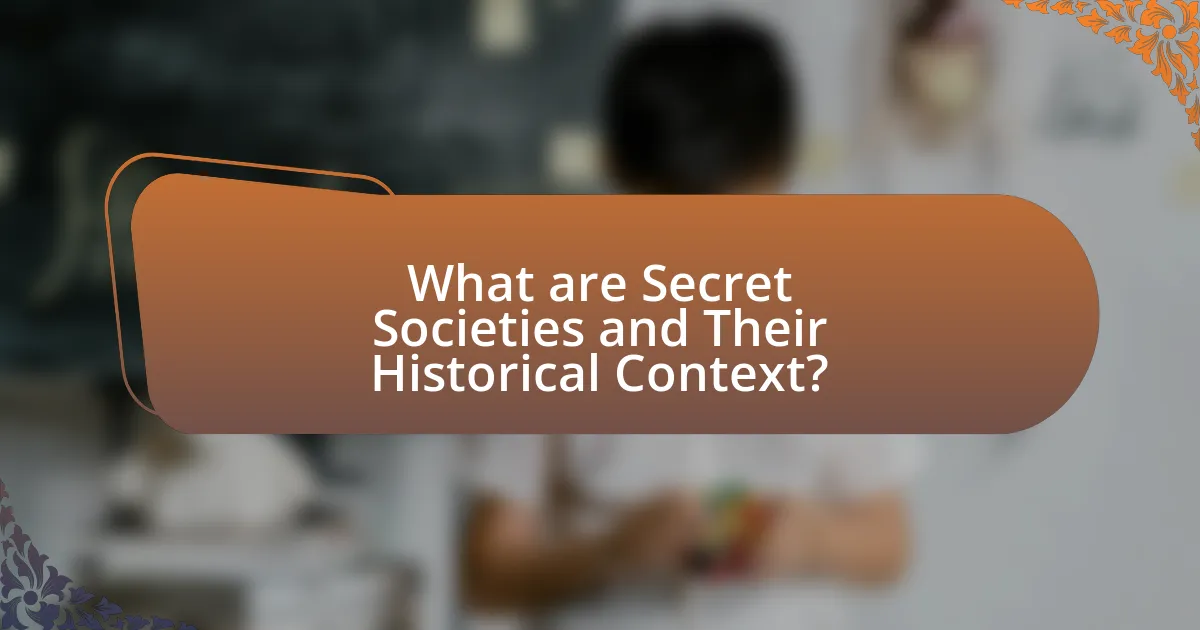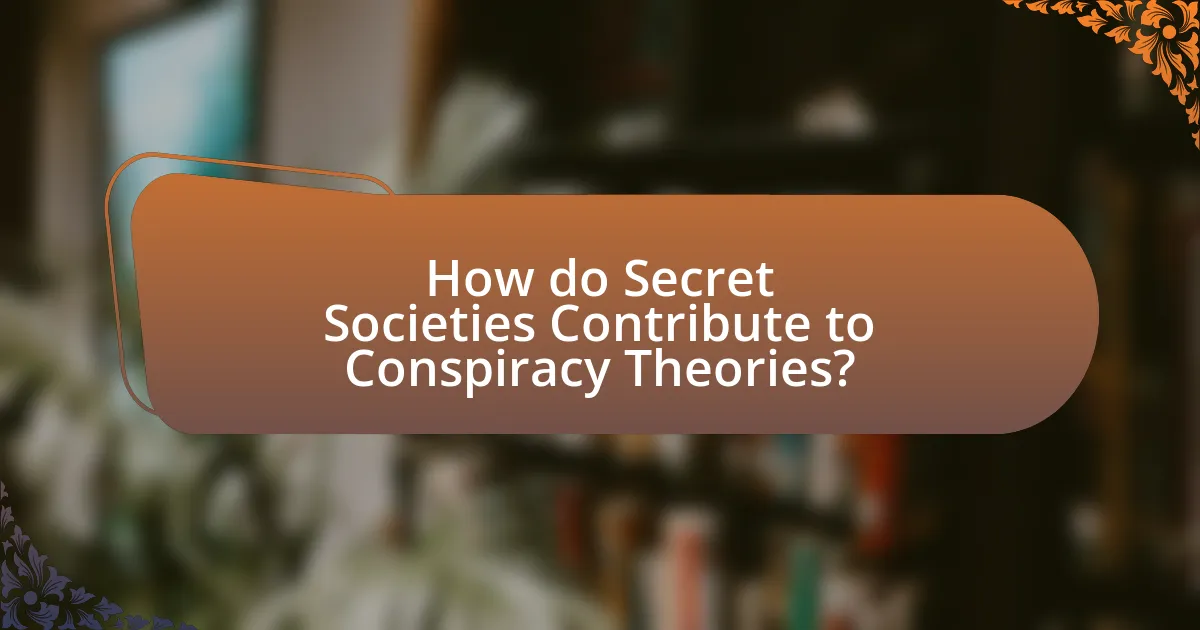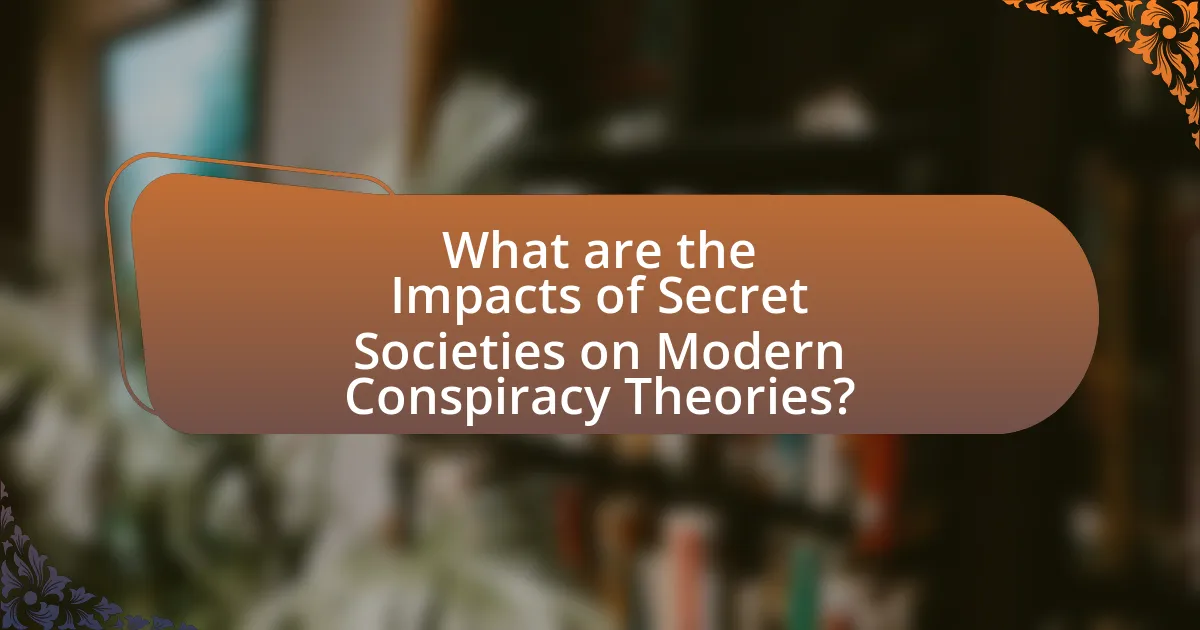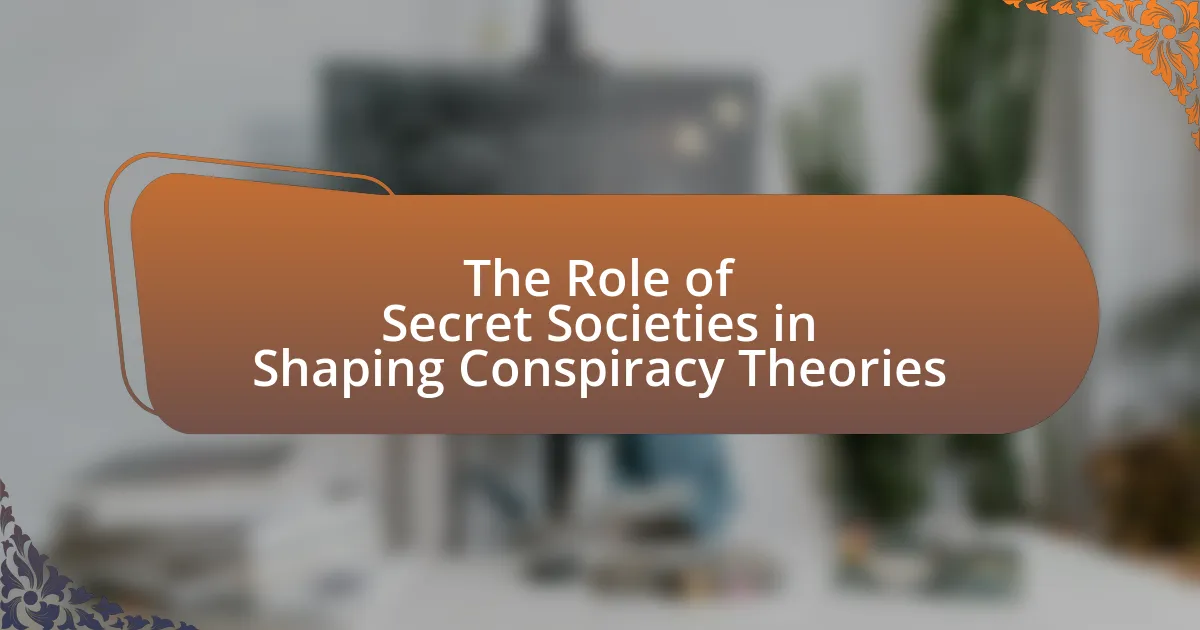Secret societies, such as the Freemasons and the Illuminati, have historically operated in secrecy, influencing political and social events while fostering conspiracy theories. This article examines the historical context of these organizations, their impact on significant events like the American and French Revolutions, and the motivations behind individuals joining them. It also explores how secret societies contribute to conspiracy theories by creating an environment of distrust and speculation, the psychological factors that drive belief in these theories, and the role of modern communication methods in amplifying these narratives. Additionally, strategies for critically assessing the credibility of conspiracy theories related to secret societies are discussed, emphasizing the importance of evaluating sources and differentiating between fact and fiction.

What are Secret Societies and Their Historical Context?
Secret societies are organizations that operate in secrecy, often with exclusive membership and hidden agendas. Historically, these societies have emerged in various cultures, such as the Freemasons in the 18th century, which sought to promote Enlightenment ideals, and the Illuminati, founded in 1776, which aimed to influence political decisions and promote rationalism. The existence of these groups has often fueled conspiracy theories, as their secretive nature leads to speculation about their influence on political and social events. For instance, the Freemasons have been accused of manipulating governments, while the Illuminati is frequently cited in discussions about global control. These historical contexts illustrate how secret societies have shaped perceptions and narratives surrounding conspiracy theories throughout history.
How have secret societies influenced historical events?
Secret societies have significantly influenced historical events by operating behind the scenes to shape political, social, and economic outcomes. For instance, the Freemasons played a crucial role in the American Revolution, with many founding fathers being members who promoted Enlightenment ideals and democratic governance. Their influence extended to the drafting of the U.S. Constitution, where Masonic principles of liberty and fraternity were embedded in the nation’s founding documents. Additionally, the Illuminati, founded in 1776, aimed to promote rationalism and secularism, impacting the course of European politics during the Enlightenment. Their clandestine activities and networks contributed to the spread of revolutionary ideas, which ultimately led to significant political upheavals, such as the French Revolution. These examples illustrate how secret societies have acted as catalysts for change, often operating in the shadows to steer historical trajectories.
What notable secret societies have shaped history?
Notable secret societies that have shaped history include the Freemasons, the Illuminati, and the Skull and Bones. The Freemasons, founded in the late 16th to early 17th century, have influenced various political and social movements, promoting Enlightenment ideals. The Illuminati, established in 1776, aimed to promote reason and secularism, and has been linked to numerous conspiracy theories regarding global influence. Skull and Bones, founded in 1832 at Yale University, has produced numerous influential political leaders, contributing to theories about elite control in American politics. Each of these societies has left a significant mark on historical events and public perception, often becoming focal points in discussions about power and secrecy.
How do secret societies operate within political frameworks?
Secret societies operate within political frameworks by influencing decision-making processes and shaping public policy through clandestine networks and relationships. These organizations often consist of influential members from various sectors, including politics, business, and academia, who collaborate to promote shared interests and agendas. Historical examples, such as the Freemasons and the Illuminati, illustrate how these groups have historically sought to exert control over political systems, often through lobbying, strategic appointments, and the dissemination of information that aligns with their goals. Their operations can lead to the creation of conspiracy theories, as the secretive nature of their activities fosters suspicion and speculation among the public regarding their true intentions and influence on governance.
Why do people join secret societies?
People join secret societies for various reasons, including the pursuit of social connections, shared interests, and the desire for influence. These organizations often provide a sense of belonging and exclusivity, appealing to individuals seeking community and support. Historical evidence shows that many influential figures, such as politicians and business leaders, have participated in secret societies to network and gain access to resources and information that can enhance their power and status. For instance, the Freemasons, one of the most well-known secret societies, have historically attracted members from diverse backgrounds, emphasizing mutual aid and moral development while also facilitating connections that can lead to significant opportunities.
What motivations drive individuals to become members?
Individuals are driven to become members of secret societies primarily for a sense of belonging and community. This motivation is often rooted in the desire for social connection, shared values, and mutual support among like-minded individuals. Research indicates that individuals seek affiliation with groups that provide a sense of identity and purpose, which secret societies often fulfill through exclusive membership and shared rituals. Additionally, the allure of secrecy and the promise of access to hidden knowledge can further entice individuals, as evidenced by studies showing that the mystique surrounding these organizations enhances their appeal.
How do social and cultural factors influence membership?
Social and cultural factors significantly influence membership in secret societies by shaping individuals’ beliefs, values, and social networks. These factors create a sense of belonging and identity, often driven by shared cultural narratives or social norms that promote exclusivity and secrecy. For instance, individuals from communities that value tradition and collective identity may be more inclined to join secret societies that align with those cultural values, as seen in historical examples like the Freemasons, which drew members from specific social classes and cultural backgrounds. Additionally, social dynamics, such as peer influence and the desire for social capital, can motivate individuals to seek membership in these groups, reinforcing their beliefs in conspiracy theories that often emerge from the narratives propagated within these societies.

How do Secret Societies Contribute to Conspiracy Theories?
Secret societies contribute to conspiracy theories by fostering an environment of secrecy and exclusivity, which leads to speculation and mistrust among the public. The clandestine nature of these organizations, such as the Freemasons or the Illuminati, often fuels narratives that they manipulate global events or control governments. Historical instances, like the alleged influence of the Bavarian Illuminati in the late 18th century, illustrate how such groups can become focal points for conspiracy theories, as their secretive operations invite suspicion and conjecture. This dynamic is further amplified by the lack of transparency, which allows for the proliferation of unfounded claims and theories surrounding their activities.
What role do secret societies play in the creation of conspiracy theories?
Secret societies significantly contribute to the creation of conspiracy theories by fostering an environment of secrecy and distrust. Their clandestine nature often leads to speculation about their motives and activities, which can be misinterpreted or exaggerated. For example, organizations like the Freemasons and the Illuminati have been historically linked to various conspiracy theories due to their secretive practices and influential memberships, prompting narratives that suggest they manipulate global events. This interplay between secrecy and public perception fuels the imagination, leading to the proliferation of conspiracy theories that claim hidden agendas and control over societal structures.
How do the activities of secret societies fuel public suspicion?
The activities of secret societies fuel public suspicion by creating an aura of secrecy and exclusivity that leads to speculation about their intentions and actions. This secrecy often results in a lack of transparency, prompting individuals to question what is being concealed and why. Historical examples, such as the Freemasons and their clandestine rituals, have contributed to widespread beliefs that these organizations wield disproportionate influence over political and economic systems. Additionally, the absence of verifiable information about their operations allows conspiracy theories to flourish, as people seek explanations for perceived anomalies in societal structures. This dynamic reinforces a cycle of distrust, where the very nature of secret societies perpetuates the suspicion surrounding them.
What are the common themes in conspiracy theories involving secret societies?
Common themes in conspiracy theories involving secret societies include the belief in hidden agendas, manipulation of global events, and the existence of elite control over political and economic systems. These theories often suggest that secret societies, such as the Illuminati or Freemasons, operate behind the scenes to influence decision-making and maintain power. Historical examples, such as the alleged involvement of the Freemasons in the American Revolution, illustrate how these groups are perceived to orchestrate significant societal changes. Additionally, themes of secrecy and exclusivity are prevalent, as conspiracy theories frequently emphasize the idea that only a select few are privy to the true nature of these organizations and their plans.
Why are secret societies often linked to conspiracy theories?
Secret societies are often linked to conspiracy theories due to their secretive nature and perceived influence over political and social events. The lack of transparency surrounding these organizations fosters suspicion and speculation, leading individuals to believe that they may be orchestrating hidden agendas. Historical examples, such as the Freemasons and the Illuminati, have been central to numerous conspiracy theories, often portrayed as having significant control over world affairs. This connection is further reinforced by the tendency of conspiracy theorists to seek explanations for complex societal issues, attributing them to the actions of these clandestine groups rather than acknowledging multifaceted realities.
What psychological factors contribute to belief in these theories?
Psychological factors contributing to belief in conspiracy theories include cognitive biases, social identity, and the need for control. Cognitive biases, such as confirmation bias, lead individuals to favor information that supports their pre-existing beliefs while dismissing contradictory evidence. Social identity theory suggests that individuals derive part of their self-concept from group memberships, making them more likely to accept conspiracy theories that align with their group’s views. Additionally, the need for control and understanding in a complex world drives people to seek out simple explanations, often found in conspiracy theories. Research by Goertzel (1994) indicates that individuals with lower levels of trust in government and institutions are more likely to endorse conspiracy beliefs, reinforcing the idea that psychological factors play a significant role in shaping these beliefs.
How does media representation affect perceptions of secret societies?
Media representation significantly shapes perceptions of secret societies by framing them as either mysterious and powerful or as mere fictional constructs. This framing influences public belief and understanding, often leading to heightened suspicion and intrigue. For instance, films and television shows frequently depict secret societies as controlling global events, which can reinforce conspiracy theories and societal fears. Research indicates that exposure to such portrayals can increase belief in conspiracy theories, as demonstrated in studies like “The Influence of Media on Conspiracy Beliefs” by Karen M. M. van Prooijen and Jan-Willem van Dijk, published in 2014, which found a correlation between media consumption and conspiracy belief. Thus, media representation plays a crucial role in shaping how secret societies are perceived, often blurring the line between reality and fiction.

What are the Impacts of Secret Societies on Modern Conspiracy Theories?
Secret societies significantly influence modern conspiracy theories by providing a framework for distrust and speculation about hidden agendas. Their secretive nature fosters an environment where individuals speculate about their motives and actions, leading to the proliferation of conspiracy theories that often lack empirical evidence. For instance, organizations like the Freemasons and the Illuminati are frequently cited in conspiracy narratives, suggesting they manipulate global events behind the scenes. This perception is supported by historical instances, such as the public’s reaction to the Freemasons’ influence in early American politics, which fueled suspicions and conspiracy theories about their role in governance. Consequently, the existence of secret societies contributes to a culture of skepticism and conspiracy thinking, as people seek to explain complex social and political phenomena through the lens of hidden power structures.
How have modern secret societies evolved in the context of conspiracy theories?
Modern secret societies have evolved significantly by becoming intertwined with conspiracy theories, often serving as focal points for public suspicion and speculation. Historically, organizations like the Freemasons and the Illuminati have been linked to various conspiracy theories, which claim they manipulate global events from behind the scenes. In contemporary society, the rise of the internet and social media has amplified these theories, allowing for rapid dissemination and discussion of ideas regarding secret societies. For instance, the proliferation of online forums and platforms has enabled individuals to share and develop conspiracy narratives, often portraying these societies as powerful entities controlling political and economic systems. This evolution reflects a broader cultural trend where distrust in institutions fuels the belief in hidden agendas, with modern secret societies often depicted as symbols of elite control in conspiracy discourse.
What contemporary examples illustrate this evolution?
Contemporary examples illustrating the evolution of secret societies in shaping conspiracy theories include the rise of the QAnon movement and the influence of organizations like the Freemasons and the Illuminati in popular culture. QAnon, which emerged in the late 2010s, utilizes social media to propagate conspiracy theories about a supposed deep state working against former President Donald Trump, demonstrating how modern communication channels amplify secretive narratives. Additionally, the portrayal of the Freemasons and Illuminati in films and literature, such as Dan Brown’s “The Da Vinci Code,” reflects ongoing public fascination and suspicion regarding these groups, reinforcing their role in contemporary conspiracy theories. These examples highlight how secret societies continue to evolve and influence public perception through modern platforms and cultural narratives.
How do modern communication methods influence conspiracy theories related to secret societies?
Modern communication methods significantly amplify conspiracy theories related to secret societies by facilitating rapid information dissemination and fostering echo chambers. Social media platforms, for instance, allow users to share and promote conspiracy theories to vast audiences almost instantaneously, leading to increased visibility and engagement. Research indicates that misinformation spreads more quickly on platforms like Twitter and Facebook compared to factual information, as shown in a study by Vosoughi, Roy, and Aral (2018) published in Science, which found that false news stories are 70% more likely to be retweeted than true stories. Additionally, online forums and communities create environments where like-minded individuals reinforce each other’s beliefs, further entrenching conspiracy theories. This interconnectedness and immediacy of modern communication methods thus play a crucial role in the proliferation and acceptance of conspiracy theories surrounding secret societies.
What can individuals do to critically assess conspiracy theories involving secret societies?
Individuals can critically assess conspiracy theories involving secret societies by employing a systematic approach that includes evaluating sources, analyzing evidence, and understanding psychological biases. Evaluating sources involves checking the credibility of the information, such as identifying the author’s qualifications and the publication’s reputation. Analyzing evidence requires individuals to differentiate between anecdotal claims and verifiable facts, often seeking primary sources or peer-reviewed studies to substantiate or refute the claims made. Understanding psychological biases, such as confirmation bias, helps individuals recognize their own predispositions toward accepting information that aligns with their beliefs while dismissing contradictory evidence. This multifaceted approach enables individuals to form a more informed and rational perspective on conspiracy theories related to secret societies.
What strategies can help in evaluating the credibility of such theories?
To evaluate the credibility of theories related to secret societies and conspiracy theories, one effective strategy is to assess the sources of information. Reliable sources typically include peer-reviewed journals, reputable news outlets, and expert analyses. For instance, a study published in the journal “Social Psychological and Personality Science” by Karen M. M. M. van Prooijen and others highlights the importance of source credibility in shaping public perception of conspiracy theories. Additionally, cross-referencing claims with established facts and historical data can further validate or invalidate the theories. An example is the examination of the historical influence of organizations like the Freemasons, which can be substantiated through documented evidence and scholarly research.
How can one differentiate between fact and fiction in conspiracy narratives?
To differentiate between fact and fiction in conspiracy narratives, one should critically evaluate the sources of information and the evidence presented. Reliable information typically comes from credible, verifiable sources such as peer-reviewed studies, reputable news organizations, and expert analyses, while fictional narratives often rely on anecdotal evidence, unverified claims, or sensationalism. For instance, the investigation into the conspiracy theory surrounding the Illuminati reveals that many claims lack empirical support and are based on misinterpretations of historical events. By cross-referencing claims with established facts and seeking out multiple perspectives, individuals can discern the validity of the narratives presented.
